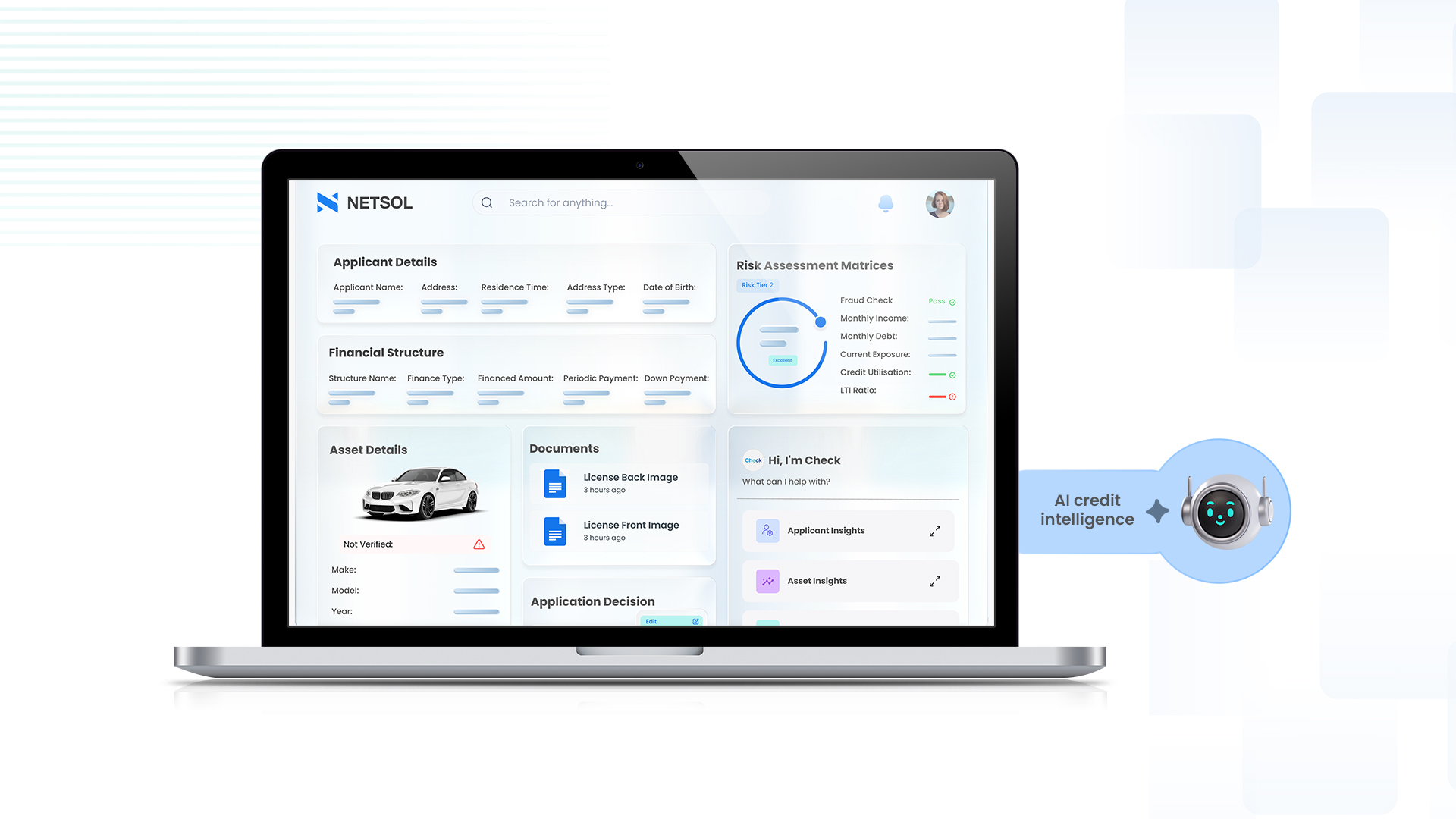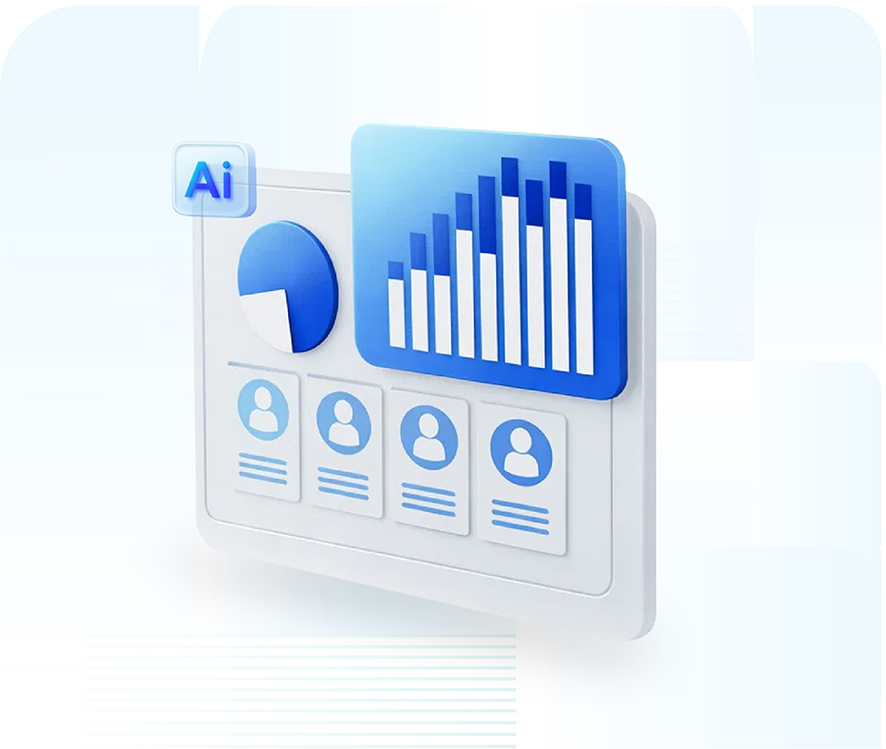Blog
The transformative impact of AI on the global asset finance and leasing industry
By Eva Kellershof VP Sales for North America and Europe, on February 13, 2025
Discover how AI is revolutionizing global asset finance and leasing industry, enhancing efficiency, risk management, customer experience and predictive insights.

As financial institutions navigate the complexities of a rapidly evolving market, AI technologies offer transformative solutions that enhance efficiency and foster innovation. The global asset finance and leasing industry is undergoing a profound transformation, driven by the rapid advancements in AI.
According to Forbes, analysts have predicted that AI will save more than $1 trillion in the banking sector by 2030. As banks, automotive and equipment finance and leasing companies seek to optimize their operations, enhance decision-making processes and improve customer experiences, AI technologies are emerging as game changers.
From streamlining credit assessments and automating risk management to personalizing client interactions and enabling predictive analytics, AI is reshaping the landscape of asset finance and leasing across the globe. This article explores the multifaceted impact of AI on the industry, primarily highlighting the opportunities it presents for stakeholders navigating this dynamic environment.
The rise of AI: The future is now
The rise of artificial intelligence marks a pivotal period in our technological evolution, heralding a future that is unfolding before our very eyes. No longer confined to the realm of science fiction, AI has integrated itself into various aspects of daily life, from smart assistants that enhance our productivity to advanced algorithms driving decision-making in not just the financial services sector, but across industry verticals.
This transformative technology is reshaping how we interact with the world, enabling unprecedented efficiencies and innovations. As we stand on the brink of this new era, the implications of AI extend far beyond mere convenience; they challenge us to rethink our approaches to work, creativity and problem-solving. Indeed, the future is now and embracing AI's potential will define the next chapter of human progress.
Artificial intelligence encompasses a range of technologies that enable machines to perform tasks that typically require human intelligence, such as learning, reasoning and problem-solving. Key components of AI include machine learning, natural language processing (NLP), computer vision, predictive analytics and robotic process automation (RPA). These technologies are now being integrated into various aspects of the asset finance and leasing industry, fundamentally altering how financial institutions operate.
According to the 'AI in Fintech Global Market Report 2024' shared by Research and Markets, the market expansion of AI in the fintech sector surged from $9.15 billion in 2022 to $11.59 billion in 2023, demonstrating a robust CAGR of 26.8%. For finance and leasing businesses, AI can streamline processes, optimize asset management and enhance customer interactions. By automating routine tasks, analyzing large data sets and predicting market trends, AI enables companies to make more informed decisions and deliver superior services.
Key applications of AI in asset finance and leasing
Streamlined operations and process automation
AI technologies can significantly streamline operations within the asset finance and leasing industry. By automating routine tasks such as document verification, data entry, document processing, reporting and compliance checks, financial institutions can reduce processing times and minimize the risk of human error.
AI algorithms can efficiently handle large volumes of leasing applications, significantly cutting down the time and effort needed for manual processing. This results in quicker decision-making and enhances overall operational efficiency. Further, AI can identify inefficiencies in workflows and suggest improvements, leading to swifter processing and lower operational costs. By examining economic indicators and market conditions, AI can provide insights into asset performance and market trends, helping organizations to make strategic decisions about asset acquisitions and disposals.
According to a report by Deloitte, 78% of companies surveyed by them had already or were implementing robotic process automation. RPA enables organizations to automate repetitive processes and free up valuable human resources for more strategic tasks. This not only enhances efficiency, but also improves employee satisfaction, as staff can focus on higher-value activities, such as customer engagement and strategic planning, ultimately enhancing productivity.
Enhanced risk assessment and credit scoring
One of the most significant applications of AI in asset finance and leasing is its ability to enhance risk assessment and credit scoring. Traditional methods often rely on historical data and human judgment, which can be biased or incomplete. AI algorithms can process large volumes of data from various sources, including traditional credit bureau information, alternative datasets and even unstructured data.
AI systems are particularly skilled at analyzing diverse alternative data, such as utility payments, rental history, social media activity and smartphone usage patterns. AI-driven models therefore generate more accurate credit scores. By leveraging ML algorithms, organizations can identify patterns and correlations that human analysts may overlook, giving financial institutions a more comprehensive view of an individual’s financial health and creditworthiness. This not only reduces the time required for credit assessments, but also improves the accuracy of risk evaluations, enabling lenders to make informed decisions.
The World Bank reports that more than 1.4 billion people globally lack access to banking services. A promising feature of AI-powered credit scoring is therefore also its ability to improve financial inclusion by broadening access to credit for underserved communities.
Predictive maintenance and asset management
The integration of AI with the Internet of Things (IoT) has opened new avenues for asset management and predictive maintenance. By equipping assets with sensors, organizations can collect real-time data on performance and usage patterns. AI algorithms can then analyze this data to predict maintenance needs, reducing downtime and extending the lifespan of assets.
Predictive maintenance minimizes unexpected equipment failures, ensuring that assets remain operational and available for use, which is crucial for leasing companies. It provides insights into asset performance, helping companies make informed decisions about investments, upgrades or divestments.
This proactive approach not only improves operational efficiency, but also enhances the value proposition for customers, as they can rely on well-maintained assets that meet their operational needs. Predictive maintenance powered by ML offers an effective way to address the challenges of unforeseen machine failures for the equipment finance and leasing sector.
Deloitte highlights that AI-driven anomaly detection and fault prediction in predictive maintenance can provide significant advantages, such as extending runtime by 10 to 20%, cutting maintenance costs by up to 10% and reducing the time required for maintenance scheduling by as much as 50%.
Fraud detection and prevention
Fraud remains a significant concern in the financial services industry. AI plays a vital role in detecting and preventing fraudulent activities. By utilizing predictive analytics and real-time monitoring, AI can identify potential fraud, detect anomalies and proactively mitigate risks.
AI enables powerful data integration. It can process and analyze data from various sources, including transaction histories, customer profiles and external databases, to build a comprehensive view that aids in fraud detection. It also enables behavioral analysis as AI can assess customer behavior over time, establishing a baseline for what is typical. Sudden changes in behavior can trigger alerts, indicating potential fraudulent activity.
Payments giant Visa is leveraging artificial intelligence and machine learning to combat fraud. From October 2022 to September 2023, the company successfully prevented $40 billion in fraudulent activity, nearly double the amount from the previous year. Machine learning algorithms can continuously learn from historical fraud cases, enabling organizations to refine their detection methods over time. By leveraging AI for fraud detection, companies can reduce financial losses and protect their reputation.
Personalized customer experiences
In an era where customer expectations are higher than ever, delivering personalized experiences is crucial for success. AI can analyze customer data to gain insights into preferences, behaviors and needs, enabling organizations to tailor their offerings accordingly. By forecasting future customer needs, AI helps financial institutions proactively reach out with relevant products or services. Pertaining to automotive leasing, a study revealed that 72% of consumers are willing to pay extra for a leasing contract that provides customization options.
UK-based NatWest’s digital assistant, Cora, is handling 58% more inquiries year on year, completing 40% without human intervention. AI-powered chatbots can provide instant support to customers, answering queries and guiding them through the leasing process. Additionally, predictive analytics can identify potential issues before they arise, allowing organizations to proactively address customer concerns and enhance satisfaction.
With AI-powered credit underwriting, credit decisioning is carried out swiftly, which further improves customer satisfaction. Additionally, AI models assess risk more accurately by considering a wider range of data points, leading to personalized financing options. Further, AI systems learn from customer interactions, continuously improving recommendations and services based on user feedback.
Finding the perfect vehicles for customers
For the automotive finance and leasing industry, the technology streamlines and tailors the process of finding the right vehicle for customers. Generative AI systems can assess a wealth of customer data, including financial capacity, credit scores, personal preferences and lifestyle needs.
By integrating this information with a vast and comprehensive vehicle database, AI can create a personalized list of cars that meet each customer's specific lending criteria. There is no need for time-consuming manual searches and comparisons, as AI has enabled customers with a superior experience of customized car recommendations. Personalized recommendations are also enabled as AI algorithms analyze other factors including past searches and purchase history in order to suggest vehicles for customers that best match their individual tastes and requirements.
AI-powered chatbots and virtual assistants use NLP to understand customer queries, making it easier for users to find information about vehicles through conversational interfaces. Further, AI-powered simulations allow customers to experience vehicles through virtual test drives, helping them feel more confident in their choices before visiting a dealership.
Optimized pricing
Generative AI also possesses the ability to create dynamic pricing models. Recent studies revealed that AI-powered dynamic pricing can lead to revenue increases between 5% and 20%. By analyzing real-time market data, customer trends and macroeconomic factors, AI systems can determine optimal price points for different finance and leasing options.
AI gathers vast amounts of data, including historical sales data, current market trends, customer demographics and economic indicators. By analyzing real-time market conditions, such as competitor pricing and demand fluctuations, AI can identify price trends and consumer behavior patterns.
Further, ML algorithms build models that predict how different factors - like interest rates, vehicle demand and customer preferences - affect pricing. Using optimization techniques, AI identifies price points that maximize revenue while considering constraints like market demand and cost structures.
AI systems continually learn from new data and market shifts, allowing them to refine pricing models over time for better accuracy. By leveraging these techniques, AI helps companies establish competitive, data-driven pricing that aligns with market dynamics and customer expectations.
Challenges of AI integration
Despite the numerous advantages, there are challenges associated with integrating AI into asset finance and leasing.
Data quality and management
AI relies heavily on data and poor data quality can lead to inaccurate results. Organizations must invest in robust data management practices to ensure the integrity and accuracy of the information used in AI systems.
Regulatory compliance
The financial services industry is heavily regulated, and AI applications must comply with various legal requirements. Companies must navigate these regulations while adopting AI technologies, which can be complex and time-consuming.
Resistance to change
Cultural resistance within organizations can hinder the adoption of AI. Employees may fear job displacement or be skeptical of new technologies. It is crucial for leaders to foster a culture of innovation and collaboration to mitigate these concerns.
Future prospects
When assessing the future of AI in the asset finance and leasing industry, we realize that as the technology continues to evolve, several trends are expected to shape the landscape.
Increased collaboration
Partnerships between financial institutions and technology firms will become more common as companies seek to leverage specialized expertise in AI. This collaboration can drive innovation and enhance service offerings.
Continuous learning and adaptation
AI systems will become increasingly sophisticated, capable of learning and adapting to new information. This continuous improvement will enable companies to stay ahead of market trends and customer needs.
Ethical considerations
As AI becomes more prevalent, ethical considerations around data privacy, bias and transparency will gain prominence. Companies will need to develop frameworks to address these issues responsibly.
Expansion of AI applications
The scope of AI applications in asset finance and leasing will continue to expand. From predictive maintenance for leased assets to automated compliance checks, the potential for innovation is vast.
Conclusion
The impact of AI on the global asset finance and leasing industry is profound, offering a range of benefits that enhance efficiency, decision-making and customer experience. However, the journey toward successful AI integration is not without challenges. By addressing issues such as those pertaining to data quality, regulatory compliance and even cultural resistance, financial institutions can unlock the full potential of AI.
As the industry evolves, ongoing collaboration, ethical considerations and continuous learning will be essential in navigating this transformative landscape. Embracing AI will not only enable finance and leasing companies to remain competitive but also position them to lead in a future defined by innovation and growth.
To learn more about our AI-powered solutions for the global asset finance and leasing industry, connect with us.
Related blogs

Blog
From credit checks to credit intelligence: How AI is redefining underwriting for captives

Blog
Shared financing models for high-value assets unlocking Indonesia’s next wave of growth

Blog



